XII Reunión Española sobre Criptología y Seguridad de la Información - RECSI 2012, Mondragon, pp. 297-302, Sep 2012.
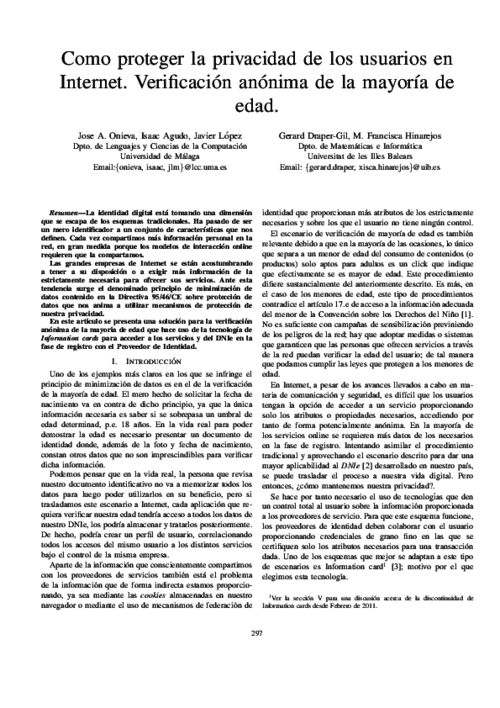
Electronic Commerce Research and Applications, vol. 3, no. 2, Elsevier, pp. 152-162, 2004.
Abstract
Non-repudiation is a security service that provides cryptographic evidence to support the settlement of disputes in electronic commerce. In commercial transactions, an intermediary (or agent) might be involved to help transacting parties to conduct their business. Nevertheless, such an intermediary may not be fully trusted. In this paper, we propose agent-mediated non-repudiation protocols and analyze their security requirements. We first present a simple scenario with only one recipient, followed by a more complicated framework where multiple recipients are involved and collusion between them is possible. We also identify applications that could take advantage of these agent-mediated non-repudiation protocols.
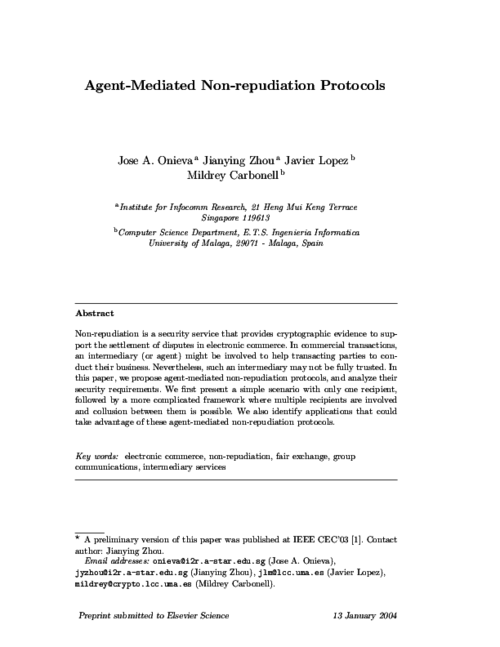
Telecommunications Systems, vol. 35, pp. 161-176, September, 2007.
Abstract
In any kind of electronic transaction, it is extremely important to assure that any of the parties involved can not deny their participation in the information exchange. This security property, which is called non-repudiation, becomes more important in Digital Rights Management (DRM) scenarios, where a consumer can freely access to certain contents but needs to obtain the proper Right Object (RO) from a vendor in order to process it. Any breach in this process could result on financial loss for any peer, thus it is necessary to provide a service that allows the creation of trusted evidence. Unfortunately, non-repudiation services has not been included so far in DRM specifications due to practical issues and the type of content distributed. In this paper we analyze how to allow the integration of non-repudiation services to a DRM framework, providing a set of protocols that allows the right objects acquisition to be undeniable, alongside with a proof-of-concept implementation and a validation process.
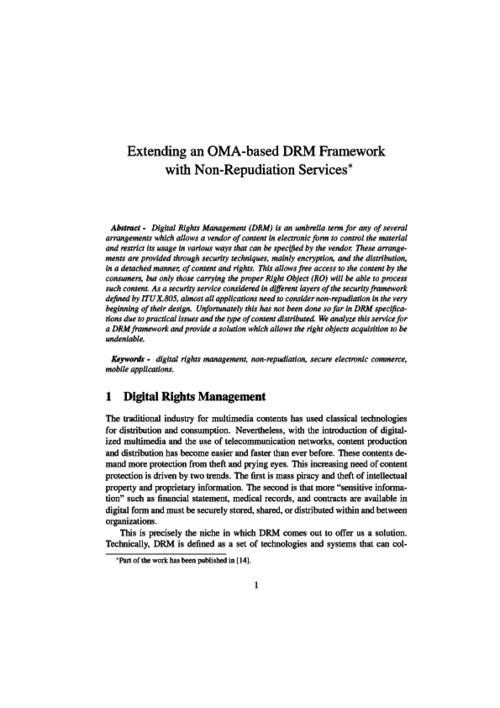
Fifth International Conference on Information and Communications Security, LNCS 2836, Springer, pp. 112 - 123, October, 2003.
Abstract
With emerging decentralized technologies, peer-to-peer (P2P) content distribution arises as a new model for storage and transmission of data. In this scenario, one peer can be playing different roles, either as a distributor or as a receiver of digital contents. In order to incentivize the legal distribution of these contents and prevent the network from free riders, we propose a charging model where distributors become merchants and receivers become customers. To help in the advertisement of digital contents and collection of payment details, an intermediary agent is introduced. An underlying P2P payment protocol presented in [1] is applied to this scenario without total trust on the intermediary agent.
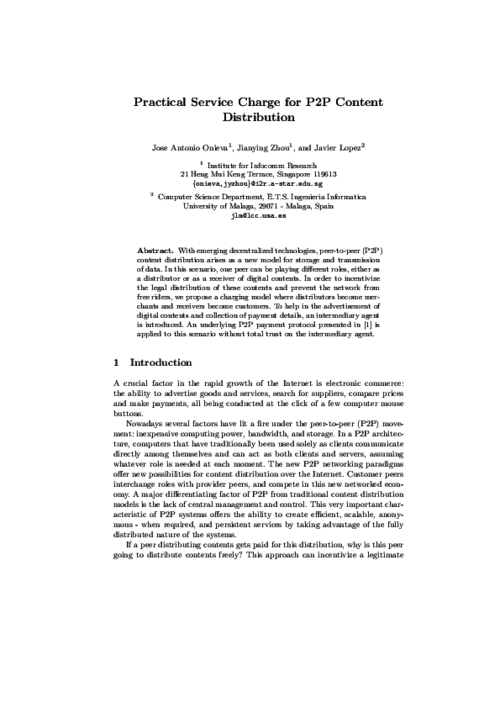
5th Symposium on Signal Processing and Information Technology (ISSPIT’05), IEEE, pp. 472-477, 2005.
Abstract
Digital Rights Management (DRM) is an umbrella term for any of several arrangements which allows a vendor of content in electronic form to control the material and restrict its usage in various ways that can be specified by the vendor. These arrangements are provided through security techniques, mainly encryption, and the distribution, in a detached manner, of content and rights. This allows free access to the content by the consumers, but only those carrying the proper Right Object (RO) will be able to process such content. As a security service considered in different layers of the security framework defined by ITU X.805, almost all applications need to consider non-repudiation in the very beginning of their design. Unfortunately this has not been done so far in DRM specifications due to practical issues and the type of content distributed. We analyze this service for the a DRM framework and provide a solution which allows the right objects acquisition to be undeniable.
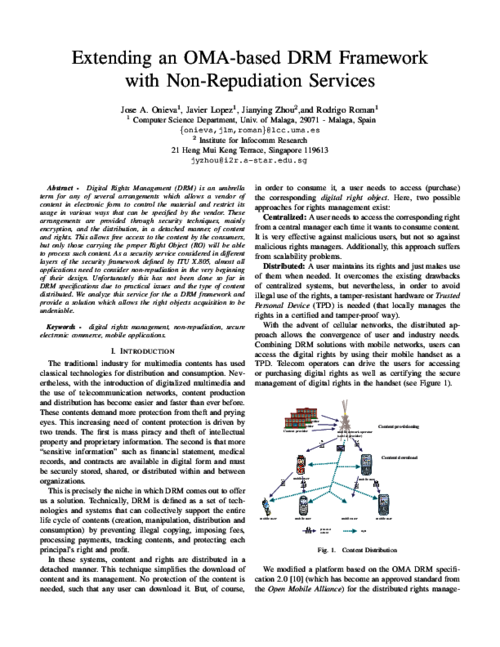
IEEE Internet of Things Journal, vol. 6, issue 5, IEEE Computer Society, pp. 8038-8045, 10/2019. DOI
Abstract
Edge Computing paradigms are expected to solve some major problems affecting current application scenarios that rely on Cloud computing resources to operate. These novel paradigms will bring computational resources closer to the users and by doing so they will not only reduce network latency and bandwidth utilization but will also introduce some attractive context-awareness features to these systems. In this paper we show how the enticing features introduced by Edge Computing paradigms can be exploited to improve security and privacy in the critical scenario of vehicular networks (VN), especially existing authentication and revocation issues. In particular, we analyze the security challenges in VN and describe three deployment models for vehicular edge computing, which refrain from using vehicular- to-vehicular communications. The result is that the burden imposed to vehicles is considerably reduced without sacrificing the security or functional features expected in vehicular scenarios.
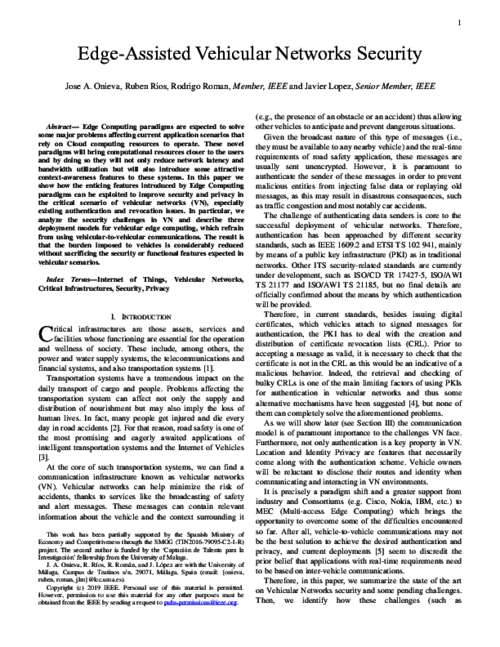
|
"Information Security Theory and Practices. Smart Devices, Convergence and Next Generation Networks", Workshop in Information Security Theory and Practices, vol. 5019, Springer Verlag, 2008. 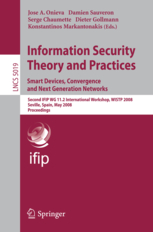 |  |
Computer Communications, vol. 27, no. 16, pp. 1608-1616, 2004.
Abstract
Non-repudiation is a security service that provides cryptographic evidence to support the settlement of disputes. In this paper, we introduce the state-of-the-art of non-repudiation protocols for multiple entities. We extend an existing multi-party non-repudiation (MPNR) protocol to allow an originator to send different messages to many recipients in a single transaction. We further propose an optimistic multi-party non-repudiation protocol for exchange of different messages. The performance of our protocols with enhanced functionalities is still promising in comparison with existing MPNR protocols.
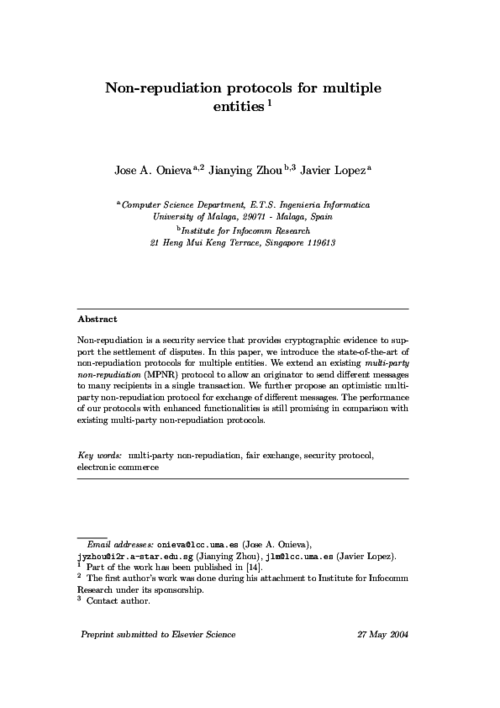
Proceedings of 6th International Conference on Cryptology in India, LNCS 3797, Springer, pp. 311–321, Decemeber, 2005.
Abstract
Contract signing is a fundamental service in doing business. The Internet has facilitated the electronic commerce, and it is necessary to find appropriate mechanisms for contract signing in the digital world. From a designing point of view, digital contract signing is a particular form of electronic fair exchange. Protocols for generic exchange of digital signatures exist. There are also specific protocols for two-party contract signing. Nevertheless, in some applications, a contract may need to be signed by multiple parties. Less research has been done on multi-party contract signing. In this paper, we analyze an optimistic N-party contract signing protocol, and point out its security problem, thus demonstrating further work needs to be done on the design and analysis of secure and optimistic multi-party contract signing protocols.
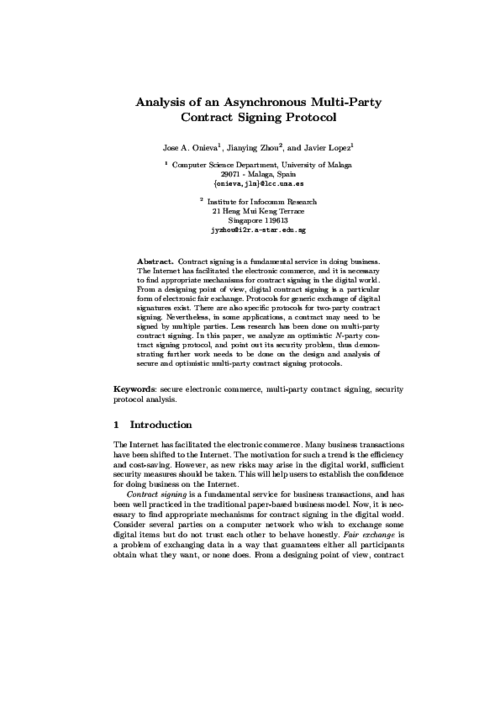
XIII Reunión Española sobre Criptología y Seguridad de la Información (RECSI 2014), Universidad de Alicante, pp. 333-338, 09/2014.
Abstract
Continuamente aparecen nuevos estudios así como nuevos desarrollos de canales encubiertos. Como veremos, existen más de cien diseños distintos para redes de ordenadores, pero no hemos encontrado en la literatura ningún análisis, diseño e implementación de canales encubiertos sobre redes de sensores. En este artículo presentamos los resultados del diseño e implementación de un canal multitasa basado en los tiempos de monitorización sobre una red de sensores. En este proceso se han establecido las principales propiedades necesarias y, en base a ellas, se desarrolla e implementa el canal encubierto. Se describe el proceso de desarrollo y se analiza su detectabilidad.
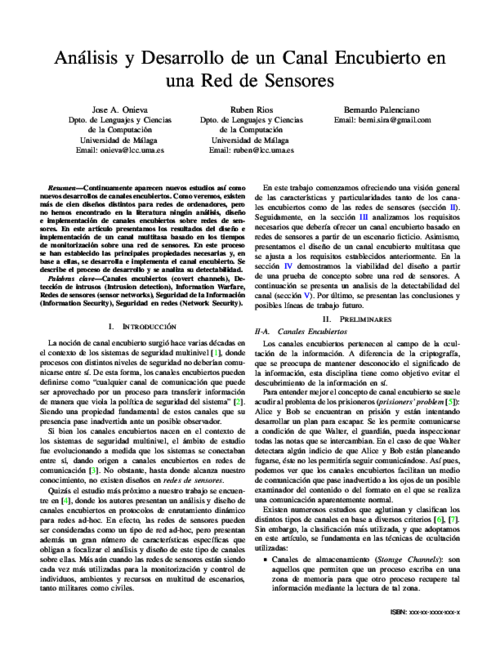
ACM Comput. Surveys, vol. 41, no. 1, pp. 5, December, 2008.
Abstract
Nonrepudiation is a security service that plays an important role in many Internet applications. Traditional two-party nonrepudiation has been studied intensively in the literature. This survey focuses on multiparty scenarios and provides a comprehensive overview. It starts with a brief introduction of fundamental issues on nonrepudiation, including the types of nonrepudiation service and cryptographic evidence, the roles of trusted third-party, nonrepudiation phases and requirements, and the status of standardization. Then it describes the general multiparty nonrepudiation problem, and analyzes state-of-the-art mechanisms. After this, it presents in more detail the 1-N multiparty nonrepudiation solutions for distribution of different messages to multiple recipients. Finally, it discusses advanced solutions for two typical multiparty nonrepudiation applications, namely, multiparty certified email and multiparty contract signing.
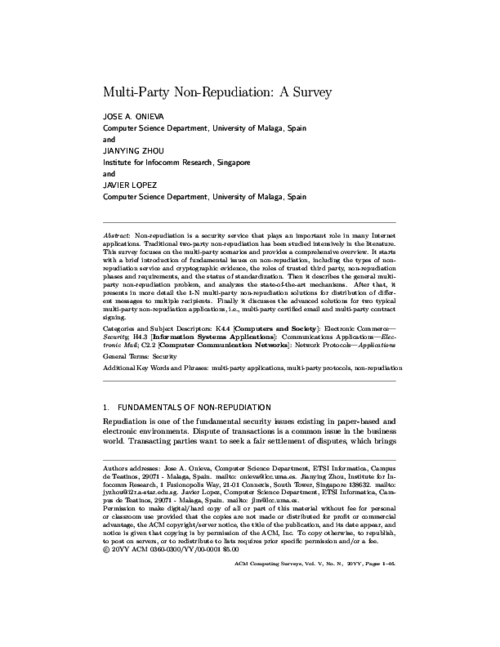
VIII Reunión Española sobre Criptología y Seguridad de la información (RECSI’04). Avances en Criptologia y Seguridad de la Informacion, Diaz de Santos, pp. 537-546, 2004.
Abstract
El correo electrónico certificado es un servicio añadido al correo electrónico estándar, en el cual el remitente desea obtener un recibo procedente del destinatario. Para este servicio, encontramos que los protocolos de intercambio (justo) son un componente principal para asegurar la corrección en la ejecución de los servicios de correo electrónico certificado, ya que los ítems que ambas partes presentan (en este caso específico, el mensaje de correo y el recibo del mismo) deben ser intercambiados sin que ninguna de las partes obtenga una ventaja durante el proceso sobre la otra. Podemos encontrar en esta línea de investigación protocolos optimistas eficientes para el intercambio electrónico, y mas concretamente para Correo Electrónico Certificado (CEC) y Firma Electrónica de Contratos (FEC). Realizando un estudio adecuado hemos observado que algunos aspectos de dichos protocolos podrían ser mejorados. En este artículo proponemos una solución que permite a ambas entidades terminar el protocolo de forma asíncrona. También extendemos el protocolo a múltiples usuarios.
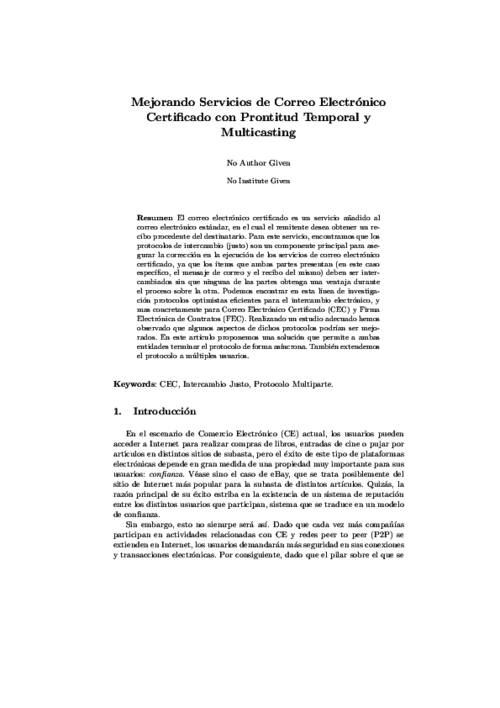
IX Reunion Española sobre Criptologia y Seguridad de la Informacion (RECSI’06), UOC S.L., pp. 129-141, 2006.
Abstract
Digital Rights Management (DRM) es un término general para cualesquiera de las soluciones que permite a un vendedor de contenido en forma electrónica controlar el material y restringir su uso de distintas maneras. Estas soluciones son posibles, por un lado gracias a técnicas de la Seguridad de la Información, principalmente cifrado de datos, y por otro a la distribución, de manera independiente, de contenido y derechos digitales. Esto permite que los consumidores puedan acceder libremente al contenido, pero sólo aquellos que adquieran el derecho digital apropiado (RO) podrán procesarlo. Como servicio de seguridad considerado en diversas capas del marco de seguridad definido por la recomendación ITU X.805, casi todas las aplicaciones necesitan considerar la propiedad de no repudio en las etapas iniciales de su diseño. Desafortunadamente, esto no ha sido así en general, y más concretamente en especificaciones DRM; debido a consideraciones en la práctica y al tipo de contenido a distribuir. Analizamos este servicio para un marco de DRM y proporcionamos una solución que permita que la adquisición de derechos digitales sea un operación que no pueda repudiarse.
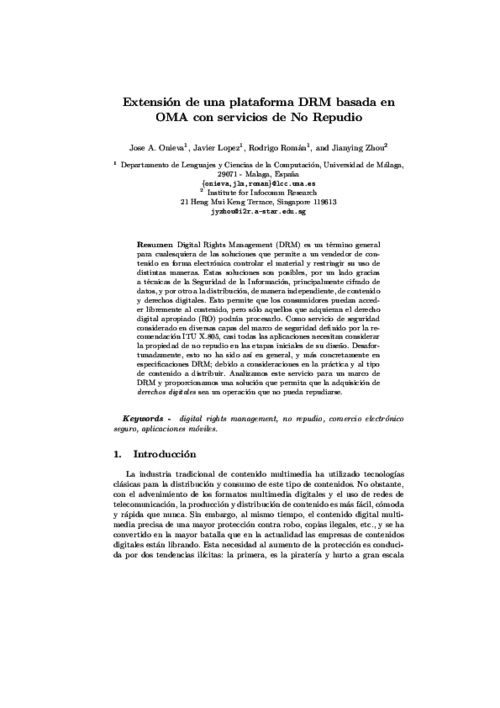
5th Conference on Electronic Commerce, IEEE Computer Society, pp. 207-214, June, 2003.
Abstract
n commercial transactions, an intermediary might be involved to help transacting parties to conduct their business. Nevertheless, the intermediary may not be fully trusted. In this paper, we introduce the concept of intermediary (or agent) in a non-repudiation protocol, define the aims of intermediary non-repudiation protocols, and analyze their security requirements. We present a simple scenario with only one recipient, followed by a more complicated framework where multiple recipients are involved and collusion between them is possible.
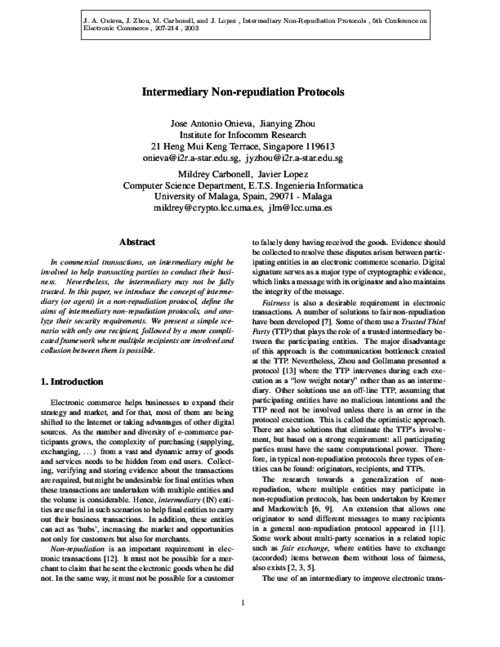
|
"Secure Multi-Party Non-Repudiation Protocols and Applications", Advances in Information Security, vol. 43, Springer, 2009. 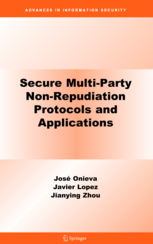 |  |
Fourth International Network Conference, University of Plymouth, pp. 327-335, 2004.
Abstract
Certified email is a value-added service of ordinary email, in which a sender wants to obtain a receipt from a recipient. Fair exchange protocols are a key component for certified email service to ensure fairness, i.e., the items held by two parties are exchanged without one party obtaining an advantage. We can find in the literature simple and fast optimistic protocols for fair electronic exchange and, more specifically, for certified electronic mail (CEM) and electronic contract signing (ECS). We have observed that some aspects of those protocols could be substantially improved. This paper presents two major contributions. Firstly, we provide a solution that allows both parties to end the protocol timely in an asynchronous way. Then, we extend the certified email service to the multicast scenario.
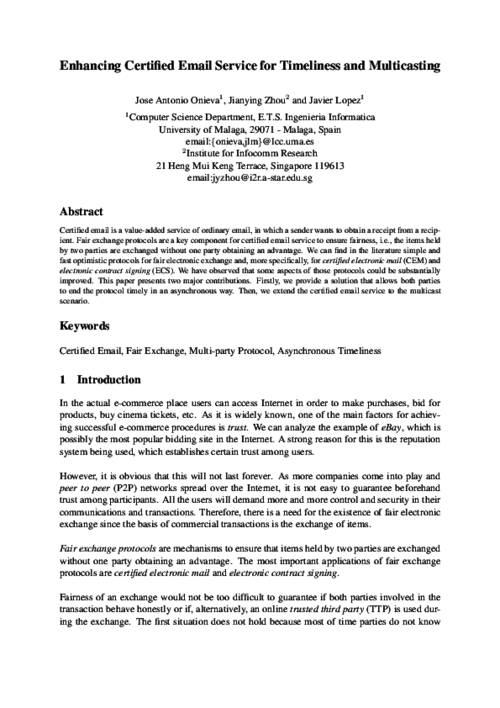
18th IFIP International Information Security Conference. Security and Privacy in the Age of Uncertainty (IFIP SEC’03), IFIP, pp. 37-48, May, 2003.
Abstract
Non-repudiation is a security service that provides cryptographic evidence to support the settlement of disputes. In this paper, we introduce the state-of-the-art of multi-party non-repudiation protocols, and analyze the previous work where one originator is able to send the same message to many recipients. We propose a new multi-party non-repudiation protocol for sending different messages to many recipients. We also discuss the improvements achieved with respect to the multiple instances of a two-party non-repudiation protocol, and present some applications that would benefit from them.
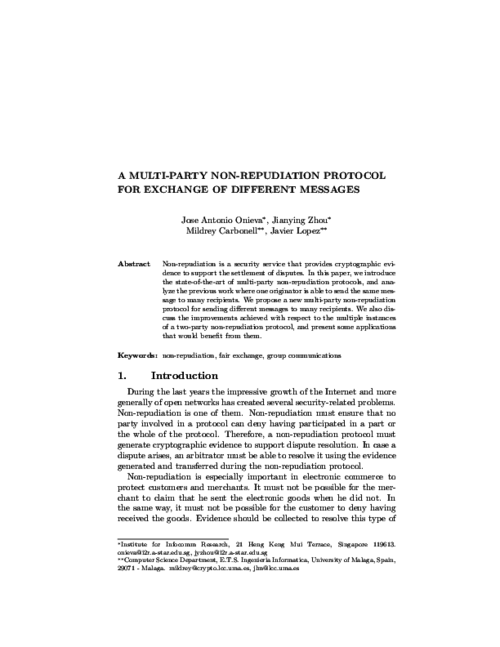
 ]
]